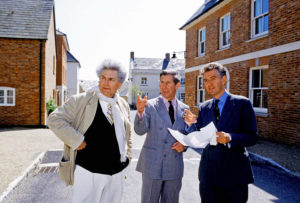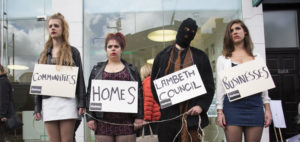“Is conservatism prepared to supply, in the new era we are entering, the main creative and moulding influence in the national life?” It is a question that the modern Conservative Party — abandoned by the young, flatlining in the polls, and plainly ideologically drained — ought to dwell on. Disraeli once described the Liberals of Gladstone’s first administration as “a range of exhausted volcanoes”. The current government might be flattered by the comparison.
But the question above was actually first asked a century ago by Noel Skelton, arguably the most important Conservative thinker you’ve never heard of. Skelton’s general radicalism and social purpose helped to defibrillate a party whose electoral future seemed terminal. But in his focus on property inequality, he has much to a teach a government currently grappling with a distorted and stratified housing market. And this is an issue which is increasingly animating voters: new UnHerd polling shows a majority believe house prices need to come down, rising to around three-quarters among 18-34-year-olds. Skelton’s faith that conservatism was not the cause of, but the solution to this inequality has much to teach his successors today.
The Twenties (the last one) was a decade of general tumult and crisis. A newly-enfranchised working-class electorate was contending with a dark economic depression, and Conservatives needed to convince it of the continuing relevance of their ideals. Skelton, a major in the Great War and later a minister in the Scotland Office, was in his forties when he first entered Parliament in 1923. Nonetheless, he was a member of what older Tories pejoratively called the “YMCA” — a group of younger MPs who would cut their teeth in the age of universal suffrage.
Indeed, that was precisely the question confronting the Conservative Party in the Twenties: what would conservatism mean in the context of mass democracy? The Left had clarity about its purpose. As Skelton put it, the strength of socialism was that it was “making an intellectual appeal at the very moment when the craving for mental nourishment [was] so universal”. In the aftermath of a period of war and upheaval, Labour was offering a vision for the country. The Right could not afford to fail to do the same. In an attempt to answer this question, Skelton wrote a series of essays for The Spectator — essays which have a strong claim to being the most important the magazine has ever published. “Constructive Conservatism” — originally four articles written between April and May 1923 and later collected as a pamphlet — was Skelton’s attempt to offer “a democratic articulation of conservatism”. The “master problem of the new era”, in his mind, was the discrepancy between the “political status and educational status” of the British people and their “economic status”.
While the British public was now entirely franchised and widely educated, property ownership specifically remained the preserve of the few, and many lived in conditions of acute economic insecurity. Consequently, British society had become “lop-sided” and “unstable”. And this lop-sidedness threatened the legitimacy of a political order based on capitalism, as well as the shared sense of obligation between different social groups which had underpinned Disraelian one-nation conservatism. Labour’s solution to these societal conflicts was socialism, state ownership and redistribution; what was the Conservative Party’s?
“To make democracy stable and four-square” was the goal for Skelton. And his means for achieving it was his most famous coinage: “property owning democracy”, a vision of society in which the wage earner had “property and status”, and in which private property would serve as a vehicle for the moral and economic development of the individual. Far from his ideology dying out in a democratised age, Skelton argued, property ownership would make conservatism and democracy mutually supportive. The teetering “stability of the social structure” would have a new prop. And it would also teach responsibility, self-sufficiency, and pride — values which inculcate a one-nation sense of shared obligations, and which recoil from state dependency. For a still-rigidly hierarchical party, it was a remarkable intellectual and ideological innovation.
Skelton was the first to formulate what has become a guiding ideal of 20th century Britain. Property ownership — and home ownership specifically — is one of our most widely endorsed and deeply ingrained aspirational values. Every major party is ostensibly committed to boosting the number of homeowners in the UK. Indeed, the Labour Party is currently the most ambitious on this score: Keir Starmer has said he would pursue a homeownership target of 70% if elected. Property ownership commands such wide support because its value to society transcends partisan interest: it strengthens both capitalism and democracy, two things that all those in the political mainstream want to nurture and preserve in one combination or another.
But Skelton’s essays also helped to change British conservatism, bursting the assumptions of an aristocratic bubble to create space for the dynamic, constructive forces of the postwar. While his name is largely forgotten, his influence was pronounced. Churchill appreciated “the force of our conservative theme” when drawing attention to the differences between a “personal property owning democracy”, as advocated by Conservatives, and socialist state ownership. “Our objective”, Sir Anthony Eden declared to the 1946 Party Conference, “is a nationwide property owning democracy” — not “the concentration of ownership in the hands of the state”, but “the distribution of ownership over the widest practicable number of individuals”. Harold Macmillan went further than anyone in making Skelton’s ideals a practical reality. For him, “of all forms of property suitable for such distribution, house property is one of the best”. As housing minister, he built 300,000 a year, and it was his logic which resulted in election posters boasting that voting Conservative had produced “New homes for a million folk”.
The property owning democracy was given new meaning in the Eighties by Thatcher. For her, it meant transferring property away from the state to individuals and families via the Right to Buy scheme. She paid tribute to Macmillan and “the practical way in which he made conservative philosophy a reality for the average person in Britain”, but instead of adding to the already significant portfolio of the state, Thatcher committed to dispersing it amongst the British public. Her legacy was to transform the psychology of a constituency of former social housing tenants, producing millions of proud, self-sufficient property owners with a renewed faith in both capitalism and democracy. They rewarded her and the Conservative Party at the ballot box.
Since then, however, conservatism has lost its way. It has committed the mistake of presuming that the party of property should be the party of the already propertied. Yet the vitality of our democracy — and the continued relevance of the Conservative Party — depends on making property ownership an attainable aspiration for a wide cross-section of the population. Instead, Conservatives have concerned themselves with feathering the nests of existing homeowners at the expense of the aspirant ones. Starting with Thatcher herself, Conservatives have failed to ensure a steady supply of new homes, house prices have exploded, and homeownership rates have accordingly declined, particularly among the younger generations who want to see house prices fall.
Houses have come to be seen not merely as homes but as scarce “assets” which appreciate in value for existing owners but which are thus necessarily less and less accessible to younger generations. Instead of owning their own home, younger working-age people are transferring their wealth to older homeowners in the form of rent. One hundred years on from Skelton’s articles, the status of the property owning democracy today is one of decline. Skelton’s vision has become perverted — no longer a stabilising ideal, but a destabilising symbol of inequity. How can young people support capitalism when they are unable to become owners of capital? How can a sense of intergenerational obligation be sustained when younger cohorts appear to be denied the economic opportunities of previous generations? Currently, property ownership is undermining both democracy and conservatism, not reinforcing them, stratifying society into mutually resentful camps along economic lines.
There is always a risk that Conservatives fall back upon tired or hackneyed articulations of their philosophy — usually a reheated, pastiche Thatcherism — rather than reimagining it to address the challenges of the present. At the present moment, this would be an error with existential implications. But history gives cause for hope. The force of Skelton’s ideas shook conservatism out of its sclerosis and made it relevant in the democratic era. Who is going to take up Skelton’s mantle and steer the party out of its current crisis?
Michael Gove – a passionate Unionist and, that rare thing, a genuinely intellectual politician — resembles Skelton in more ways than one. His new plan to cut through the jungle of lease holding interests exhibits some of the ambition required. And there is no shortage of parliamentary ginger groups sprouting up that resemble the “YMCA” of the interwar years which provided the party with so much fresh thinking, and to which Skelton, Eden and Macmillan all belonged. But it took two decades before Skelton’s vision for the country percolated to the top of his party. Conservatives today cannot afford to wait that long for an intellectual reinvigoration.
Disclaimer
Some of the posts we share are controversial and we do not necessarily agree with them in the whole extend. Sometimes we agree with the content or part of it but we do not agree with the narration or language. Nevertheless we find them somehow interesting, valuable and/or informative or we share them, because we strongly believe in freedom of speech, free press and journalism. We strongly encourage you to have a critical approach to all the content, do your own research and analysis to build your own opinion.
We would be glad to have your feedback.
Source: UnHerd Read the original article here: https://unherd.com/





